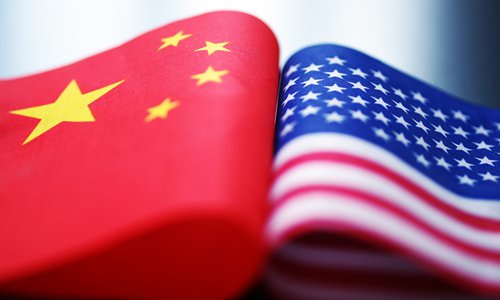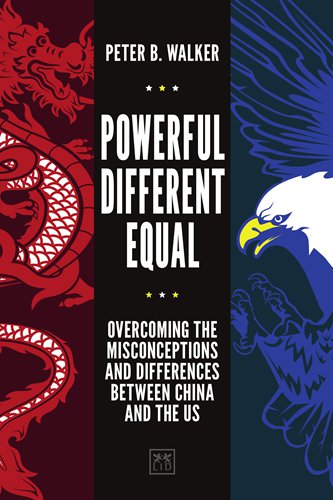HOME >> OPINION
How to close understanding gap between China, the US?
Source:Global Times Published: 2019/9/5 22:23:40 Last Updated: 2019/9/8 21:59:30

Photo: IC
Editor's Note:
Amid a raging trade war, where are China-US relations headed? Are Beijing and Washington enemies? Peter Walker (Walker), author of Powerful, Different, Equal and a senior partner emeritus at McKinsey & Company, shared his insights with Global Times (GT) reporter Yan Yunming.
GT: Does the US view China as an enemy?
Walker: According to a recent review by the US government, both China and Russia are considered strategic threats. People who understand China see the threat as largely economic. China is viewed in the US, fairly or unfairly, as having stolen intellectual property from the US over many years and as having behaved unfairly on trade. Large trade deficits between the two countries were in accordance with trade treaties agreed to by both sides, so categorizing trade actions consistent with the treaties as unfair is hard to understand.
China 2025 initiative calls for China to become a leader in 10 advanced technology areas. The US is currently the global leader in most of those areas so the 2025 initiative is seen as a direct challenge/threat to the US. So the answer to your question is yes, the US sees China as an economic enemy.
Predictably the military-industrial complex in the US sees China as a threat. This position helps justify further investments in the military even though China's defense budget is approximately one third of the US despite China having four times the US population. Furthermore China's track record is peaceful compared to the US over the past 200 years and especially over the last 20 years.
GT: You said the economy is the "true battlefield." Is the current trade war a "true battle" the US launched against China? Where do you think the trade war is headed?
Walker: The trade war launched by the US in the form of higher tariffs on a wide range of Chinese goods is a "true battle," but economists and business leaders have characterized it as poorly conceived and hurting both countries. Despite Trump's claim that "trade wars are easy to win" the economic burden of tariffs is born by the US consumers not by China as Trump asserted. The current estimate is the existing tariffs will increase costs to the consumers in the US by $600 annually per household and if planned tariffs are implemented, that number will increase to $1,000 per household. A core rationale put forward to justify the tariffs was the return of manufacturing jobs to the US. That has not happened to a meaningful extent because US firms importing from China turned to other low-cost countries, largely in Southeast Asia.
Beyond these short-term impacts the US action has led China to accelerate its efforts to both reduce its dependency on the US as a trading partner and to double down on their technological 2025 goals. If the goals of the trade war were to strengthen the US economy at the expense of the Chinese, the longer-term results will be the opposite. The Chinese understand that and are in no hurry to settle unless they can strike a deal in their best interest. Finally, if the US economy struggles, the 2020 elections will pressure Washington to back off on tariffs as they have already begun to. The US has always been a proponent of free trade and that position is likely to be reasserted with a change in the administration.

Photo: Courtesy of Peter Walker
GT: Many US politicians harbor a cold war mindset against China. Why is that?
Walker: The primary reasons are two-fold. First the US has enjoyed the strongest economy globally for the last 150 years and is going to lose that position to China over the coming decades. Politicians view that outcome as unacceptable and will do whatever they can to prevent it. Most global economists see China as ultimately prevailing and as it becomes more apparent, the position of US politicians is likely to harden.
The second core reason is that US politicians know little about Chinese history and culture and consider its model of a strong central government as unacceptable rather than a natural outgrowth of China's history and culture. China, on the other hand, understands the US very well and will continue to do what's in its best interest.
GT: You say in your book that "in the US there is a disturbing amount of mistrust toward China that is rooted in common misunderstandings about Chinese history, culture and government… on the flipside, China has a far greater understanding of the US." What has led to this skewed balance?
Walker: The skewed balance is largely explained by history and culture. China was the most populous and advanced country in the world for most of its history. It lost that position when it missed the industrial revolution that transformed the West and the US in particular in the 19th and early 20th century.
China was subjugated by the West during the 19th century and torn by internal strife and self-inflicted wounds under Mao Zedong with the Great Leap Forward and the Cultural Revolution. When Deng Xiaoping took over in 1978 he launched the reform and opening-up initiative to accelerate China's development with a focus on manufacturing and technology. China learned rapidly from the West and became a global leader in manufacturing for export, leveraging both Western technology and a huge supply of low-cost labor. Other countries, including the US, have done the same throughout history.
Apart from China's economic initiatives it also encouraged its top students to be educated in the West in general and the US in particular. At any point in time over 350,000 Chinese students were attending universities in the US. Many of the senior officials in the Chinese government have been educated at the top universities in the US. American fashion, movies and music have fully penetrated the Chinese market. And English is taught in virtually all Chinese schools. In summary, over the past 40 years China's exposure to and understanding of the US has exploded.
Until very recently the US interest in China has been modest at best and limited to missionaries, academicians and global corporations looking to penetrate the huge Chinese market. The US government over the past three years has declared China, with Russia, a strategic threat and has been attempting to contain China's rise through trade wars and limiting access to America's advanced technologies. This awakening is very recent and largely focused on economic competition. Little has been done to understand China's history and culture and what underlies its actions.
The vast majority of Americans, including senior government officials, believed for many years that China would inevitably become a democracy. Any understanding of Chinese history and culture is rooted in collectivism not individualism, and Confucian values would suggest that China and the Chinese people on the mainland have little interest in electoral democracy at other than the local level. In fact, according to the Pew Foundation, the Chinese government has among the highest level of support from its people of any major country.
While the US now wants to contain China there is little evidence that it wants to understand China. A very small number of Americans - around a million - have visited China while over 25 million Chinese have visited the US. The number of Chinese who can speak English dwarfs the number of Americans who can speak Putonghua. "Face" - or personal reputation or honor - is a cornerstone of Chinese culture yet the US government on trade issues and Hong Kong acts as though face does not exist as it threatens China to accede to its wishes or accept the consequences. Even a modest understanding of Chinese culture would suggest that the Chinese will not respond to pressure.
In summary the US lack of understanding does not suggest America's lack of collective intelligence or well-meaning any more than China's lack of interest in the rest of the world for most of its history suggested the same. As the dominant global power for 150 years, the US simply saw no compelling need to understand China until very recently. Hopefully, the US posture will shift from containment and confrontation to constructive engagement in the next phase of the relationship.
GT: How would you advise America to overcome misunderstanding? As populism is rising, many in the US don't seem keen on understanding China. To what extent do you think your suggestions will work?
Walker: Not only do the vast majority of Americans know little about China but our government's lack of understanding and its willingness to position China as an "enemy" is unlikely to lead to more willingness for a deeper understanding. Given this dynamic, the road to understanding will be long. Having given many talks in the US on this subject to a wide variety of audiences, I believe the group most ready and willing to learn are the young and the educated. They understand the importance of China to the future of their world and are sufficiently intellectually curious to want to explore a number of core questions.
By any measure change on this dimension will come slowly. My hope is that my recently published book on the US and China - Powerful, Different, Equal - will make a dent. Over time facts will come to replace unsupported assertions. Finally the closing of the understanding gap would be accelerated by a new administration moving away from a world order seen as a zero sum game with winners and losers.
GT: How do you see China-US relations panning out in the short and long term?
Walker: In the short term the trade war, as economists have said from Day 1, will hurt both sides. The notion "trade wars are easy to win" is naïve at best. Of the two players China is better able to withstand the pain given its central control over all levers and the flexibility coming with it. China will also have increasing support from its people and a willingness to sacrifice given how the US has played its hand. How the US reacts short term is less clear. Economic slowdown and rising inflation induced by tariffs on Chinese imports could adversely affect Trump in the coming election.
In the longer term China will continue to reduce its dependency on the US. Given its rapidly growing consumer market and further urbanization opportunities the Chinese economy will continue to do well. Given China's ability to graduate 16 scientists/mathematicians/engineers for every one graduating in the US, China's economic future is secure. The US will continue to be tested by its lack of investment in education and infrastructure, cutbacks in immigration and the drain of its growing military budget. Further challenges are the highly divided country and the dysfunctional partisan government. The enduring strength of the US will be its economy and corporations but the headwinds are increasing.
Newspaper headline: How Beijing, Washington can come closer
Posted in: VIEWPOINT